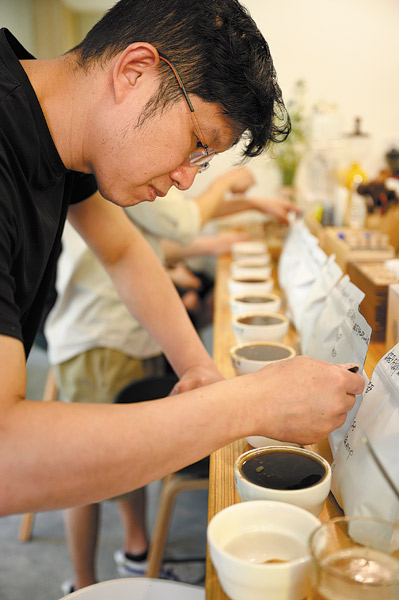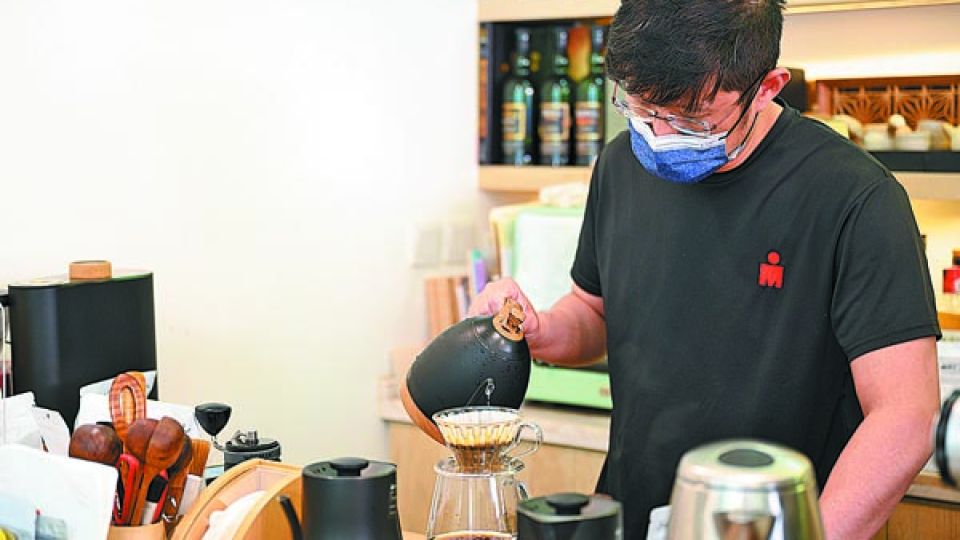June 6, 2022
GUANGZHOU – Inside a coffee shop in downtown Guangzhou, Guangdong province, there is not only a buying frenzy of coffee and desserts but also the practice of traditional Chinese medicine.
The shop, owned by Tsai Hsiching of Taiwan and his wife, has become a hot leisure and TCM treatment spot since it opened in October 2019.
“We not only make specially baked coffee but offer TCM treatments to our customers,” Tsai said. “Coffee shops are considered favorable places for business meetings, as well as platforms linking young people to TCM.”
Tsai and his wife became certified TCM doctors after completing their studies at Guangzhou University of Chinese Medicine about a decade ago.
“Young people like to try TCM treatment when they discover that such services are available in the coffee shop. Many have become regular TCM customers here,” he said.
Tsai’s shop, Changtan Coffee, is located in the city’s booming Tianhe district, where there are more than 1,000 coffee shops of different sizes and styles. Half of those are in the central business area-about 50 shops per square kilometer.
Tianhe’s central business area boasts the most Fortune Global 500 companies in Guangzhou. About 120 businesses have their headquarters in the district, accounting for 25 percent of the total.
“There are many young people working around the shop. As a result, it is an ideal place to promote TCM by integrating medical treatment with coffee,” Tsai said.
In China, a growing number of TCM pharmacies have introduced coffees that combine TCM ingredients and coffee, such as goji berry latte, hawthorn and rose americano and sugar snap pea cappuccino.
However, Tsai said they would not consider such innovative styles anytime soon.
“We will focus on making specially roasted coffee and promoting TCM treatment services,” he said.
In the shop, all coffee is prepared by hand, with beans roasted to light or medium levels.
“We don’t bake the beans too deep because we want to avoid excess caramelization,” Tsai said.

Tsai Hsi-ching makes coffee at his shop. [PHOTO BY CHEN CHUHONG/CHINA NEWS SERVICE]
Young people often suffer from sub-optimum health or diseases because of high pressure and irregular work schedules, so it is essential that they take care of their health in their daily lives and reduce their risks, he said.
In addition to specially roasted coffee, the shop also designs ice cream that is infused with TCM ingredients. It has found favor among young customers who appreciate healthy food.
Some years ago, Tsai’s wife, Su Yun-ya, helped a special dessert shop in Taiwan formulate medicated ice cream. “So I began to make it by myself in my shop,” she said.
After matching TCM properties and making adjustments, three types of ice cream are on the menu, flavored by angelica sinensis, turmeric and longan.
“Ice cream integrated with medicinal ingredients of a warm nature tastes a little magical. It’s very delicious,” Su said.
Packaged ice cream has become a hot seller in the shop.
“Ice cream with TCM properties can not only reduce the damage of ice products to health as much as possible but also satisfy the desires of young people,” she said.
According to Su, some customers who visited the shop during business trips to Guangzhou have developed an interest in TCM treatment. “They come here to drink coffee, but later become regular TCM customers,” she said.
The shop offers customers mainly with traditional TCM therapies, such as acupuncture and moxibustion. “There will be huge market potential in promoting TCM among young people on the Chinese mainland,” she said.


